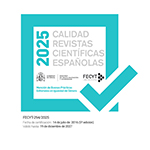“Die Lüge wird zur Weltordnung gemacht”: procesos victimarios y distorsión de la objetividad en la obra de Franz Kafka
Abstract
Despite the huge number of critical comments on Kafka, some important works of this writer can still be called “the commentators’ despair” and remain un-decoded. The present article explores the presence of a leit-motiv in several Kafka’s works (the language of persecution and the depiction of victimization processes), along with the ethical and epistemological questions it arouses. In this light, several recurrent elements in Kafka’s works (violence, slander, unjust trials, the loneliness of the main characters, the collective nature of the power agencies, or the presence of the figure of the spectator in violent situations) are explained in a unified way. Moreover, it is argued that Kafka has reflected in his writings the difficulties to detect the violence inflicted in the victimary circles, and the perversion of truth that it implies. The question arises whether Kafka could reflect in works as Die Verwandlung that perversion (and whether it would be possible in this way to understand why such a work has not been decoded so far).Downloads
Article download
License
In order to support the global exchange of knowledge, the journal Revista de Filología Alemana is allowing unrestricted access to its content as from its publication in this electronic edition, and as such it is an open-access journal. The originals published in this journal are the property of the Complutense University of Madrid and any reproduction thereof in full or in part must cite the source. All content is distributed under a Creative Commons Attribution 4.0 use and distribution licence (CC BY 4.0). This circumstance must be expressly stated in these terms where necessary. You can view the summary and the complete legal text of the licence.










